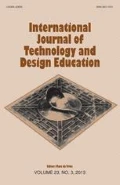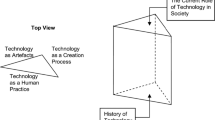Abstract
The purpose of this article is to provide an overview of the analysis of the Early Childhood Education (ECE) curriculum in six countries involved in the UPDATE-project, and on that basis, propose a conceptual foundation for technology education in ECE that aims to enhance gender sensitive technology education in the continuum from early years to adulthood. The existing ECE curricula in the participating countries were analysed according to the general pedagogical approach as well as the contents specific to technology education. In many cases technology education was presented generally or implicitly, embedded in various curriculum content areas, and the existing curricula did not offer much support for teachers to figure out the nature, aims and pedagogical means of early childhood technology education. The comparison of the curricula raised some common key-issues which are important to construe more theoretically. In consequence, the article also focuses on the contemporary view of child-centred pedagogy and the conceptualisation of technology education fitting into the scope of ECE. Play is highlighted as a fundamental way of learning seldom studied in the context of technology education. In addition, a gender perspective on technology education deals with equal possibilities of both sexes to acquire knowledge, abilities and attitudes needed in technological agency.


Similar content being viewed by others
Notes
The National Curriculum Guidelines on ECE (for day-care in Finland); The National Core Curriculum for Preschool Education (for 6-years-old).
Framework for children 3–5 by Scottish Consultative Council on the Curriculum; National Curriculum in United Kingdom (for key stage 1: ages 5–7).
Baden Württenberg; Bavaria; Berlin; North Rhine-Wetphalia; Rhineland-Palatinate.
References
Alamäki, A. (1999). How to educate students for a technological future: Technology education in early childhood and primary education. Doctoral dissertation. University of Turku.
BOEN. (2002). MEN. Programme de l’école primaire. HS no. 1 du 14 février, Paris.
Bredekamp, S., & Rosegrant, T. (1992). Reaching potentials through appropriate curriculum: Conceptual frameworks for applying the guidelines. In S. Bredekamp & T. Rosegrant (Eds.), Reaching potentials: Appropriate curriculum and assessment for young children (Vol. 1, pp. 28–42). Washington: NAEYC.
Bredesen, O. (2004). Nye gutter og jenter—en ny pedagogikk? [New boys and new girls—new pedagogy?] NIKK, Nordisk Institutt for Kunnskap om Kjonn. Oslo: J.W. Cappelen Akademisk Forlag. Retrieved 25 September 2008, from http://www.nikk.uio.no/mannsforskning/publikasjoner/nyegutter.html.
Chatoney, M. (2003). Construction du concept de matériau dans l’enseignement des«sciences et technologie»à l’école primaire : perspectives curriculaires et didactiques. Thèse de doctorat, Aix-Marseille, Université de Provence.
Curriculum Framework for children 3–5. (2001). Scottish Consultative Council on the Curriculum (2nd rev. ed.). Dundee, Glasgow: Learning and Teaching Scotland. Retrieved 15 August 2009 from http://www.ltscotland.org.uk/earlyyears/about/curriculum/framechildren3to5/guidance.asp.
Early technical education. (2003). Eu-project. Retrieved 5 August 2008, from www.earlytechnicaleducation.org.
de Vries, M. J. (2005). Teaching about technology: An introduction to the philosophy of technology for non-philosophers. Dordrecht, Netherlands: Springer.
Fried, L. (1990). Kindergartenerziehung heute: geschlechtstypisch oder geschlechtsflexibel? In K. Berty, L. Fried, H. Gieseke, & H. Herzfeld (Eds.), Emanzipation im Teufelskreis: Zur Genese weiblicher Lebensentwürf (pp. 44–69). Weinhiem: Deutscher Studien Verlag.
Fthenakis, W. E., & Oberhuemer, P. (Eds.). (2004). Frühpädagogik international, Bildungsqualität im Blickpunkt. Wiesbaden: VS Verlag für Sozialwissenschaften.
Hannover, B. (2007). Vom biologischen zum psychologischen Geschlecht: Die Entwicklung von Geschlechtsunterschieden. In A. Renkl (Ed.), Pädagogische Psychologie (pp. 339–388). Bern: Huber.
Hårdemark, E. (1989). Tema teknik. Sammanställnig av project med stöd av socialdepartment. Stockholm: Socialdepartment och Barnmiljörådet i Sverige.
Holt, B.-G. (1989). Science with young children (2nd ed.). Washington, DC: NAEYC.
Huston, A. C. (1983). Sex-typing. In P. H. Mussen (Ed.), Handbook of child psychology (Vol. IV, pp. 387–467). New York: Wiley.
MacNaughton, G. (2004). Gender–neu gedacht in der Pädagogk der frühen Kindheit. In W. E. Fthenakis & P. Oberhuemer (Eds.), Frühpädagogik international, Bildungsqualität im Blickpunkt (pp. 345–358). Wiesbaden: VS Verlag für Sozialwissenschaften.
Maslow, A. (1954/1987). Motivation and personality (3rd ed.). New York: Harper Collins.
Mitchham, C. (1994). Thinking through technology. The path between engineering and philosophy. Chicago: University of Chicago.
Oberhuemer, P. (2004). Bildungskonzepte für die frühen Jahre in internationaler Perspektive. In W. E. Fthenakis & P. Oberhuemer (Eds.), Frühpädagogik international, Bildungsqualität im Blickpunkt (pp. 359–386). Wiesbaden: VS Verlag für Sozialwissenschaften.
Parkinson, E. (1999). Talking technology: Language and literacy in the primary school examined through children’s encounters with mechanism. Journal of Technology Education, 11(1), 60–73.
Rasinen, A. (2000). Developing technology education: in search of curriculum elements for Finnish general education schools. Jyväskylä Studies in Education, Psychology and Social Research, 171 p. University of Jyväskylä, Retrieved 20 August 2008 from http://urn.fi/URN:ISBN:951-39-2401-7.
Ross, C., & Browne, N. (1993). Girls as constructors in the early years. Promoting equal opportunities in maths, science and technology. Staffordshire: Trentham.
Rubin, K., Fein, G., & Vandenberg, B. (1983). Play. In P. H. Mussen (Ed.), Handbook of child psychology (4th ed., pp. 693–774). New York: Wiley.
Schoultz, J. (1997). Pupils talk and write about simple mechanisms. In R. Ager & C. Benson (Eds.), International primary design and technology conference–a celebration of good practices (Vol. 2, pp. 26–30). Birmingham, UK: UCE.
Singer, D. G., & Revenson, T. A. (1978). A Piaget primer. How a child thinks. New York, London, Auckland: Penguin Books.
Stables, K. (1997). Critical issues to consider when introducing technology education into the curriculum of young learners. Journal of Technology Education, 8(2), 50–65.
Standards for technological literacy. (2000). Content for the study of technology. Reston, Virginia: International Technology Education Association.
Trautner, H. M. (1997). Lehrbuch der Entwicklungspsychologie. Göttingen et al.: Hogrefe.
Van Hoorn, J., Monighan-Nourot, P., Scales, B., & Rodriqgues-Alward, K. (2007). Play at the center of the curriculum (4th ed.). Upper Saddle River, New Jersey; Columbus, Ohio: Pearson Prentice Hall.
Acknowledgements
We wish to express our special thanks to Josef Seiter (Austria), Kristi Paas (Estonia), Judith Ebach and Janine von Zabern (Germany) for their input in curriculum analysis.
Author information
Authors and Affiliations
Corresponding author
Rights and permissions
About this article
Cite this article
Turja, L., Endepohls-Ulpe, M. & Chatoney, M. A conceptual framework for developing the curriculum and delivery of technology education in early childhood. Int J Technol Des Educ 19, 353–365 (2009). https://doi.org/10.1007/s10798-009-9093-9
Published:
Issue Date:
DOI: https://doi.org/10.1007/s10798-009-9093-9




